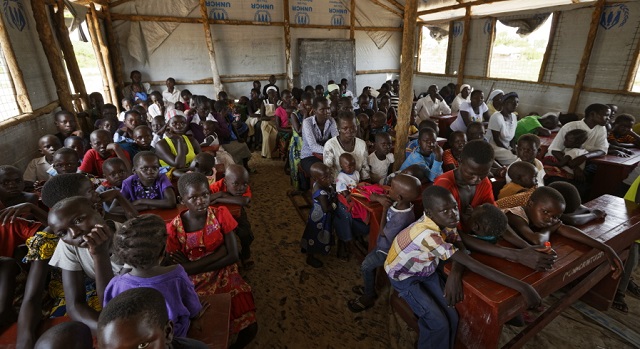
Uwezo study finds children in some refugee schools at higher learning level than their Ugandan hosts
kampala, Uganda | RONALD MUSOKE | A new Uwezo study, which compares literacy and numeracy outcomes among refugee children and Ugandan children in the neighbouring communities, has found that despite the many challenges refugees face, their learning levels are nearly at par with their Ugandan peers outside the settlements.
For the first time the Uwezo study— the seventh since 2010— gives insight into the learning outcomes and the conditions for learning in refugee settlements with those outside the camps has been done.
Uwezo, is a citizen-led organisation that does regular assessment of education outcomes in East Africa. It carried out the study in October 2017 in four refugee host districts of Isingiro in southern Uganda, and Arua, Adjumani and Yumbe in northwestern Uganda. These are the biggest refugee hosting districts as per the 2016 UNHCR statistics.
The survey sampled 103 schools and over 2000 households.
Data for over 5000 children between the ages of 3-16 were collected although 4156 children aged 6-16 were assessed in literacy and numeracy skills.
The findings were presented in Kampala on June 19, a day to the World Refugee Day.
Mary Goretti Nakabugo, the Uwezo regional manager, said their aim was to try to understand the conditions both at school and home for refugee children and those in the host communities and their impact on their learning.
The report shows that despite significant differences in education inputs between schools inside and outside refugee settlements, learning outcomes are quite similar in both places. They all perform poorly.
Uganda’s refugee burden
The United Nations High Commission for Refugees (UNHCR) and the Norwegian Refugee Council’s internal displacement monitoring centre say Uganda hosts about 1.4 million refugees.
Many are South Sudanese who flee conflict back home. UNHCR says 61% or 610,000 of these are children and youth below the age of 18 years.
When they arrive and settle, they are expected to get into school as per the 1989 Convention on Rights of children and the 1951 refugee convention which all stipulate that education is a human right.
Violet Alinda, the Advocacy Manager at Uwezo says considering that refugees spend about 17 years in host countries, for children, this means that they spend the early years (time meant for them to be in school) in these refugee settlements.
Providing access to quality education for all school-going age children is a strategic intervention because knowledgeable and skilled refugees reduce the burden on host countries when they join the labour market.
Uganda’s refugee asylum policy and refugee settlement approach is often cited as an example for other countries around the world. But Uganda has been struggling to meet most of its obligations, including provision of education for refugee children. By the end of 2017, about 345,000 children were reported by the UNHCR to be studying in all the 13 refugee settlements.
But they study in overcrowded classrooms, with insufficient learning materials and other resources. These impact their learning.
Low learning levels
The Uwezo study found that less than 10% both Ugandan pupils and the refugees in the settlement schools are able to read and comprehend a P.2 story. The same number of pupils is also not able to do a simple division task.
It is only at P.7 level, the final year of primary education, where all the refugee children assessed reached the highest level (100%). In the host communities, only 87% had acquired these competences even after going through seven years of primary education.
Full competence is acquired when a child assessed at this level is able to read a story and answer at least one of the questions set and two of the division tasks set.
Nakabugo told The Independent that in the Ugandan curriculum, division is one of the arithmetic operations that are deemed to be at the highest level.
However, the study found that in some settlements, refugees performed better than their peers in the host communities. In Adjumani District, for instance, all refugee children can read, comprehend and divide by the time they reach P.7 compared to 87% of children in P.7 outside refugee settlements. In the same district, both boys and girls are at par in performance while in Isingiro District, girls outperform the boys. Outside the refugee camps, boys generally tend to do much better than the girls.
Somalis outperform other refugees
The Uwezo study also assessed performance amongst the refugees based on nationality and duration of the refugees in the country.
According to the survey, 65% of Somali pupils in P.3 – P.7 (65%) living in refugee settlements in Uganda are more likely to be able to read, comprehend and divide than Congolese (13.5%), Burundian (18.7%), South Sudanese (20%), Rwandan (20.3%) or even Ugandan children (27%). Uwezo did not give any possible reasons for the excellence of Somali children but noted it calls for further research.
 The Independent Uganda: You get the Truth we Pay the Price
The Independent Uganda: You get the Truth we Pay the Price


